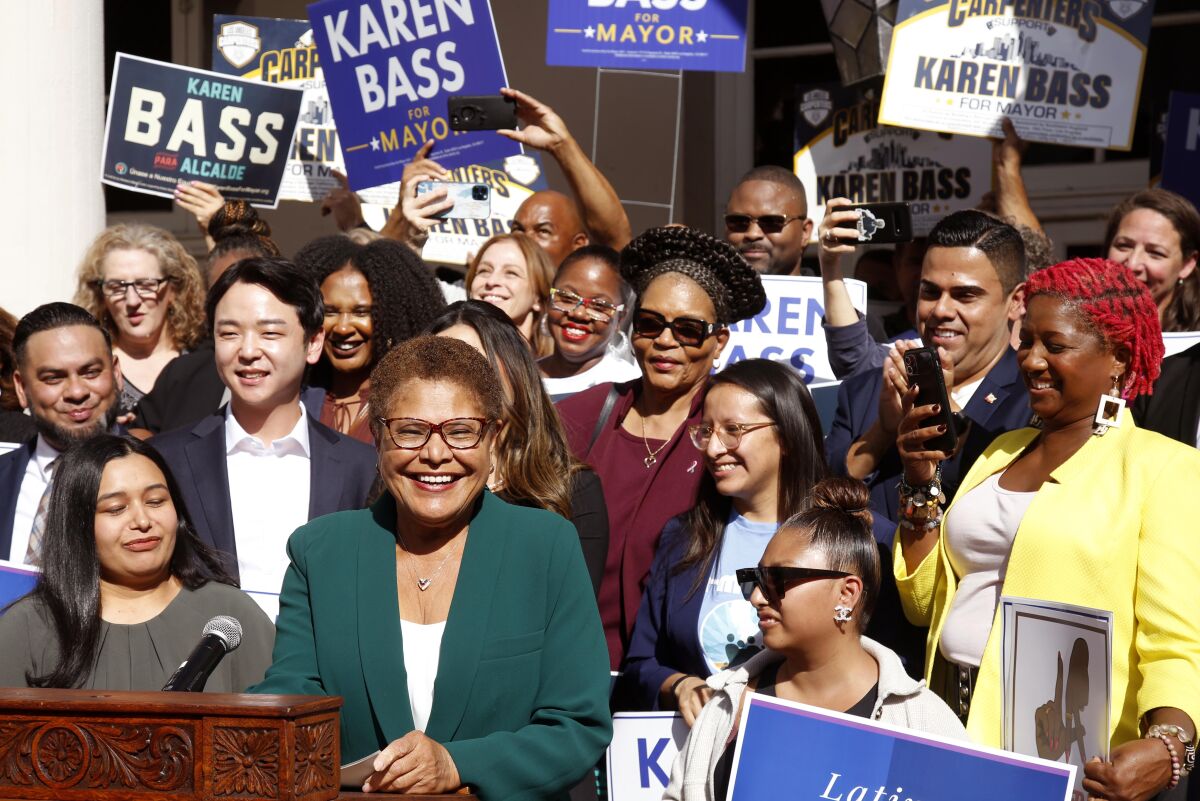
Los Angeles Mayor-elect Karen Bass addresses a crowd at the Wilshire Ebell Theatre on Thursday, a day after Rick Caruso conceded.(Genaro Molina / Los Angeles Times)
It took 241 years, but Los Angeles has finally elected a woman to be mayor.
Karen Bass will be L.A.’s first female mayor. This is a milestone she didn’t often mention on the campaign trail, but it’s a big one for a city that prides itself on its liberalism and egalitarian principles but has failed to elevate women into the highest ranks of municipal government. Until now.
On Dec. 12, Bass will be sworn in along with Hydee Feldstein Soto, L.A.’s first female city attorney, and three new female council members, doubling female representation on the council. After City Council President Nury Martinez’s resignation last month, there were just three women on the 15-member council. Newly elected members Eunisses Hernandez, Katy Young Yaroslavsky and Traci Park will join Nithya Raman, Monica Rodriguez and Heather Hutt, who was appointed in September. That’s a huge and important shift in L.A. political leadership.
Women also did well at the county and state level. With West Hollywood Councilmember Lindsey Horvath’s win over state Sen. Bob Hertzberg (D-Van Nuys) in the 3rd District, the Los Angeles County Board of Supervisors will remain an all-female board. And the most women ever — 50 — will serve in the California Legislature next session. That’s a big increase from the current 39 women holding seats between the two houses, and it’s getting closer to gender parity, which would be 60 seats.
What’s behind this wave of women into California elected office? Largely that more women are choosing to run, probably a result of momentum that started with the election of President Trump in 2016 and the #MeToo movement. The assault on abortion rights may have motivated more women, particularly Democrats, to get off the sidelines.
Just a few years ago, from 2013 to 2017, Martinez was the only female elected official in the city of Los Angeles. (Martinez resigned last month after she was caught on a recording making racist, divisive comments, some about her council colleagues and constituents.) While plenty of women have served as department heads or chiefs of staff for elected officials, women had not necessarily used those positions to launch their own political careers. Early in the mayoral campaign, when only men had entered the race, it looked like there would be no women running for the city’s top job.
The lack of women in city elected office is one reason Yaroslavsky decided to run for the 5th City Council District. Only one woman ever represented the district: Roz Wyman, who left office in 1965. Yaroslavsky, a longtime staffer for County Supervisor Sheila Kuehl, wasn’t interested in running for office, until one day, sitting in a meeting, she realized she wanted to be at the table making the decisions. Now she’ll be part of a bloc of women on the City Council.
“Having a concentration of women, it’s a real opportunity to change the culture, change the tone and reset the idea of what it means to be effective,” she said.
Political organizers have been laying the groundwork for this wave of women for years, with recruitment and training of would-be candidates. There was more opportunity this year, with an unusually large number of open seats in the Legislature, a result of lawmakers deciding to resign midterm or not run for reelection. In Los Angeles, the citywide offices and two council offices were open seats.
“There’s a reason we’re seeing more women run and win. People are really tired of what we’ve been getting, and demanding something different,” said Lindsay Bubar, a political consultant and director with Emerge California, which works to increase the number of Democratic women in office. The success this year will encourage more women to run for office in the future, she added: “The more we see it, the more we’ll see it.”
That’s good. Representation matters and women should be sharing spaces in the halls of power.